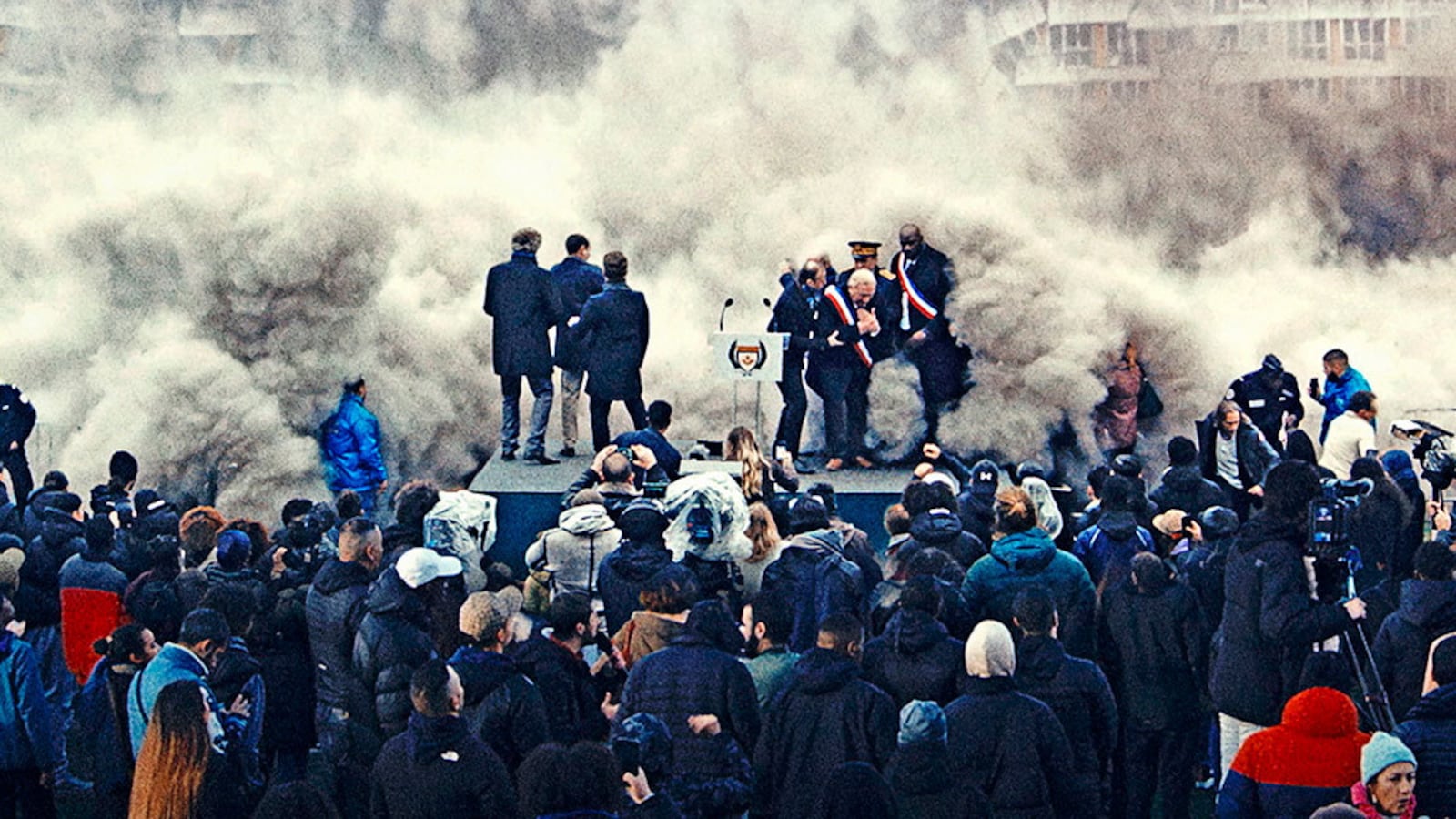TORONTO, Canada—Tensions simmer and sparks prepare to ignite in a Parisian suburb wracked with racial and class conflicts in Les Indésirables—and not exactly subtly. When not having his disenfranchised characters walk down housing project staircases into the darkness and chaos as if descending straight into Hell, director Ladj Ly is staring intently at a young man as he fumes with boiling rage, explodes in bursts of physical violence, and reacts to a poster announcing his home’s impending redevelopment (which will displace families in cruel fashion) by setting it on fire. That individual’s name is also Blaz (Aristote Luyindula), just in case his (and this situation’s) incendiary nature wasn’t already abundantly clear.
As its title implies, Ly’s film (showing at this year’s Toronto International Film Festival) is something of a companion piece to his 2019 feature debut Les Misérables, once again focusing on a banlieue populated by immigrants endeavoring to endure in the face of widespread discrimination and hostility from the police and the powers that be. In this conflagratory environment, Haby (newcomer Anta Diaw) works as a local government intern as well as serves as president of a housing association dedicated to assisting foreign transplants with their residence-related issues. When we first meet Haby, she’s slowly moving through an apartment full of mourners who’ve come to pay their respects to her dead grandmother. At the conclusion of this wake, a group of men struggle mightily to carry the coffin down numerous flights of stairs, some of them illuminating the way with flashlights and the casket banging clumsily against the railing and wall—a final example of the fact that, as Haby’s mom says, the deceased never knew peace.
Haby and her neighbors are in a similar state of constant disarray thanks to indignities both big and small. Their problems truly escalate when, at a ceremony to demolish another apartment building—a practice that’s eternally sought by the region’s politicians—the mayor suffers a heart attack and dies. In his stead, he’s replaced by Pierre (Alexis Manenti), a pediatric doctor who assumes the interim position with the blessing of canny legislator Agnes (Jeanne Balibar) but not the full support of deputy mayor Roger (Steve Tientcheu), whose weary and sideways glances indicate that he thinks he’s been unfairly passed over for the post. Roger also believes he’s better suited for the position because, as the child of African immigrants, he knows the district’s poorer communities better—something upon which Pierre’s wife Nat (Aurélia Petit) also comments, recognizing that Pierre is not exactly in tune with his new Black and Arab constituents.
With an unwavering blank expression, Pierre is the type of generally kind, sociable white man whose opinions and choices nonetheless reveal his racism. While visiting a young Syrian immigrant and her father at their home, Nat’s car is vandalized, and Pierre’s response is to use it as justification for clearing out a makeshift chop shop in a public parking lot run by Blaz’s father—thereby instigating a clash between police and citizens that’s not just inevitable but, it’s suggested, coveted by Pierre. This incident lights Les Indésirables’s proverbial fuse, triggering a cascading series of contentious actions and reactions, including Pierre proposing a crime-combating measure to ban teenagers from congregating in groups of three or more, as well as installing a restrictive curfew. Haby, in turn, decides to run for mayor against Pierre, putting them on a collision course.
As with its predecessor (and Romain Gavras’ kindred Athena), Ly’s drama is intimately familiar with its milieu, and it’s most alive when immersed in the destitute municipality’s day-to-day life. Its details are vivid, such as a woman running an illegal restaurant out of her apartment that Roger frequents in order to maintain a connection to its inhabitants. Les Indésirables understands the specific dynamics and paradigms governing this banlieue, and at its finest, it exudes a bracing realism that extends to the intricate feelings and allegiances of Roger, a man caught uneasily between two at-odds worlds, which leaves him with few reliable friends and even fewer options for achieving a détente between the haves and the have-nots.
In another (superior) version of the movie, Roger might have made for a fascinating protagonist. Yet Ly fixates instead on Haby, Pierre, and Blaz, all of whom exhibit a one-dimensionality that’s emblematic of the film, especially in its second half. Small flickers lead to combustible frictions that beget infernos of both a figurative and literal fashion. Unfortunately, the writer/director (working from a script co-penned with Giordano Gederlini) never finds a way to intriguingly complicate his scenario. Though he presents multiple divergent perspectives (as when Roger slams Haby for hating France but still preferring it to her electricity-deficient homeland), Ly overtly sympathizes with Haby, Blaz and their compatriots to the point of negating complexity. Les Indésirables need not be totally fair and balanced. However, by weighing everything so heavily, and obviously, in one direction, it eventually comes off as a thinly disguised sermon about ugly oppression and noble suffering and defiance.
If Les Indésirables is less prickly than Les Misérables, it’s not without its minor merits, beginning with Diaw, who capably conveys Haby’s transition from altruistic and hopeful to pragmatic, angry and committed. She and Tientcheu are the proceedings’ highlights alongside Julien Poupard’s cinematography, which captures the grungy disrepair of his setting’s streets and the lively, steamy, noisy confines of his subjects’ crowded domiciles. His visuals are consistently inviting, even if Ly can’t restrain himself from pushing things too far, as during a late calamity in which he tries to pull at the heartstrings by fixating on the countenances of scared, sorrowful young children.
Les Indésirables is a rallying cry against systemic prejudice that feels like a well-intentioned if simplistic and contrived Gallic version of The Wire, replete with a score that sets a leadenly ominous (and then piercingly discordant) tone. In a surprise twist, Ly eschews the very climactic blaze he’s long teased. That failure to catch fire, alas, is ultimately emblematic of a film that never wildly, thrillingly roars.
Liked this review? Sign up to get our weekly See Skip newsletter every Tuesday and find out what new shows and movies are worth watching, and which aren’t.






